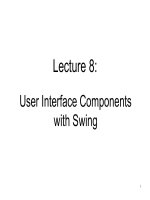Lecture 8 pointers
Bạn đang xem bản rút gọn của tài liệu. Xem và tải ngay bản đầy đủ của tài liệu tại đây (1.79 MB, 86 trang )
Ho Chi Minh City University of Technology
Faculty of Computer Science and Engineering
Chapter 8: Pointers
Introduction to Computer Programming
(C language)
TS. Võ Thị Ngọc Châu
(,
)
2017 – 2018, Semester 2
Course Content
C.1. Introduction to Computers and
Programming
C.2. C Program Structure and its
Components
C.3. Variables and Basic Data Types
C.4. Selection Statements
C.5. Repetition Statements
C.6. Functions
C.7. Arrays
C.8. Pointers
C.9. File Processing
2
References
[1] “C: How to Program”, 7th Ed. – Paul
Deitel and Harvey Deitel, Prentice Hall, 2012.
[2] “The C Programming Language”, 2nd Ed.
– Brian W. Kernighan and Dennis M. Ritchie,
Prentice Hall, 1988
and others, especially those on the Internet
3
Content
Introduction
Declare
and initialize pointers
Operations on pointers
Pointers and arrays
Variable storage and heap memory
Memory allocation and de-allocation
Pointers and structures
Pass pointers to a function
Function pointers
Summary
4
Introduction - Recall - Chapter 2
Main memory is addressable continuously.
scanf() for input data from input devices to main memory
Input a string: Input
Input a character: A
Input an integer: -123
Input device = keyboard
Input
Input device = keyboard
A
Input device = keyboard
-123
Input
Main memory ≈ variable
A
Main memory ≈ variable
-123
Main memory ≈ variable
Varying size: user-predefined Fixed sizes: character = 1 byte, integer = 4 bytes, …
char aString[5];
…
scanf(“%s”, aString)
char aChar;
…
scanf(“%c”, &aChar)
int anInteger;
…
scanf(“%d”, &anInteger)
printf(“%s”, aString)
printf(“%c”, aChar)
printf(“%d”, anInteger)
Introduction - Recall - Chapter 3
Built-in data types (primitive/fundamental)
char (signed char), unsigned char
short int, unsigned short, int, unsigned int, long int,
unsigned long int, long long int, unsigned long long
float, double, long double
void
enum (enumerated data associated with integers)
Derived data types
We haven‟t discussed
arrays [] of objects of a given type
this derived data type
pointers * to objects of a given type in detail yet!!!
structures struct containing objects of other types
union containing any one of several objects of
6
various types
Introduction - Recall - Chapter 3
Name
Operator
Description
Example
sizeof
sizeof(type),
sizeof(variable)
Returns the size (bytes) of
a type or a variable
sizeof(char)
int anInt = 0;
sizeof(anInt);
address
&Variable
Returns the address of the
memory named Variable
char aChar;
char* ptrChar;
ptrChar = &aChar;
Dereferencing
*Pointer
Returns the value of the
memory Pointer points to
Index
Variable[..]
Returns the element at the
index
aChar = *ptrChar + 1;
int intArray[3];
intArray[0] = 0;
intArray[1] = 1;
intArray[2] = 2;
anInt = intArray[1];
Structure
member
Structure_
name.member
Refers to a member of a
particular structure
struct point pt;
pt.x = 10;
7
Introduction - Recall - Chapter 6
A function to swap two integer numbers
void swap(int a, int b){
int temp;
temp = a;
a = b;
b = temp;
}
a and b will be passed by
values of int type.
void swap(int *a, int *b){
int temp;
a and b will be passed by pointers
temp = *a;
to int values, i.e. addresses of the
*a = *b;
memory that contains int values.
*b = temp;
}
8
Introduction - Recall - Chapter 6
Stack‟s values when a=10 and
b=9 in the main() function
Callee‟s stack
Caller‟s stack
000000000022FE4C
000000000022FE48
10
9
a &a
b
&b
000000000022FE4C
a
000000000022FE48
b
temp
Stack‟s values
before the callee
ends
Callee‟s stack
Caller‟s stack
000000000022FE4C
000000000022FE48
9
10
a &a
b
&b
000000000022FE4C
a
000000000022FE48
b
10
temp
9
Introduction - Recall - Chapter 7
int a[10] = {2, 3, -1, 0, 4, 7, 9};
a, array name, is the address of the first int memory location.
index
2
3
-1
0
4
7
9
0
0
0
0
1
2
3
4
5
6
7
8
9
Access to a[5] returns an
int value: 4.
int b[3][5] = {{2, 3, -1, 0, 4}, {7, 9}, {6, 11, -2, 5}};
b, array name, is the address of the first int memory location.
Access to b[2] returns
the address of b[2][0]
for the third row.
2
index
3
-1
0
4
7
9
0
0
0
6
11
-2
5
0
[0][0] [0][1] [0][2] [0][3] [0][4] [1][0] [1][1] [1][2] [1][3] [1][4] [2][0] [2][1] [2][2] [2][3] [2][4]
Access to b[0][2]
returns an int value: -1.
10
Introduction - Recall - Chapter 7
Pass a value of an element at index i of a one-dimension array a
to functions
Value passing - unchanged
Pass all the values of the elements of a one-dimension array a
to functions
Call to function func: func(b[i][j], …)
Value passing - unchanged
Pass a row at index i of a two-dimension array b to functions
Call to function func: func(a, …)
Address passing - changeable
Pass a value of an element at indices i and j of a two-dimension
array b to functions
Call to function func: func(a[i], …)
Call to function func: func(b[i], …)
Address passing - changeable
Pass all the values of the elements of a two-dimension array b
to functions
Address passing - changeable
Call to function func: func(b, …)
11
Introduction
Related to physical memory addresses,
pointers are provided as
A means for manipulation on memory
A means for pass-by-reference implementation
A means for dynamic data structures that can
grow and shrink at execution time
In Memory
[1], Figure 7.1, pp. 254
In Memory
In Memory
12
Declare and initialize pointers
A pointer of a data type
A variable whose value is an address of memory
location that contains a value of a data type
Must be declared before its use
optionally with an initial value
type_name* variable_name =opt expressionopt;
- variable_name: a valid identifier for a pointer
- type_name: a valid data type (basic, derived, a new one with
typedef)
- type_name*: a pointer type for pointers that point to memory
location of a data type type_name
- expression: an initial value (0, NULL, an address)
13
Declare and initialize pointers
type_name* variable_name =opt expressionopt;
// a variable of the char data type
// an un-initialized pointer pointing to a char
// a null pointer pointing to a char
// a null pointer pointing to a char
// a pointer pointing to a char with an
initialized pointer to aChar
pChar1
???????
pChar2
000000
pChar3
000000
pChar4
22FE37
22FE37
aChar
a
14
Declare and initialize pointers
type_name* variable_name =opt expressionopt;
// a variable of the int data type
// an un-initialized pointer pointing to an int
// a null pointer pointing to an int
// a null pointer pointing to an int
// a pointer pointing to an int with an
initialized pointer to anInt
pInt1
???????
pInt2
000000
pInt3
000000
pInt4
22FE38
22FE38
anInt
10
15
Declare and initialize pointers
type_name* variable_name =opt expressionopt;
// a variable of the float data type
// an un-initialized pointer pointing to a float
// a null pointer pointing to a float
// a null pointer pointing to a float
// a pointer pointing to a float with an
initialized pointer to aFloat
pFloat1
???????
pFloat2
000000
pFloat3
000000
pFloat4
22FE3C
22FE3C
aFloat
10.5
16
Declare and initialize pointers
type_name* variable_name =opt expressionopt;
// a variable of the point3D data type
// an un-initialized pointer pointing to a point3D
// a null pointer pointing to a point3D
// a null pointer pointing to a point3D
// a pointer pointing to a point3D with an
initialized pointer to aPoint
pPoint1
???????
pPoint2
000000
pPoint3
000000
pPoint4
22FE40
22FE40
aPoint
1.0
2.0
3.0
x
y
z
17
Declare and initialize pointers
ptrChar
22FE37
22FE37
aChar
ptrInt
22FE30
ptrInteger 22FE30
an int value in the memory
location named anInt: 9
an address of the memory location
pointed by ptrInt: 22FE30
a
22FE30
anInt
9
an address of the memory
location named anInt: 22FE30
an int value in the memory
location pointed by ptrInt: 9
18
Declare and initialize pointers
A pointer of a data type
A variable whose value is an address of memory
location that contains a value of a data type
What if a particular data type is not told?
Pointers to void
void * pointer;
19
Declare and initialize pointers
Pointers to void
The generic pointer type which is a flexible means
to manipulate memory for any data type
Adaptive data structures
Function definitions
A pointer to any data type can be assigned
directly to a pointer of type void *.
A pointer of type void * can be assigned directly
to a pointer to any data type.
A pointer of type void * can be casted to any data
type.
A void * pointer cannot be dereferenced.
20
Pointers to void
Dereference of a void* pointer:
*pVoid should be: *((int*)pVoid)
21
Declare and initialize pointers
A pointer of a data type
A variable whose value is an address of memory
location that contains a value of a data type
What if a data type is a pointer type?
Pointers to pointers
A pointer that points to the memory location
whose value is an address
A conventional variable
A pointer to an int memory location
Pointers to pointers
22
Pointers to pointers
int*** pInt3;
22FE28
pInt3
22FE30
int** pInt2;
22FE30
pInt2
22FE38
int* pInt1;
22FE38
pInt1
22FE44
int anInt;
22FE44
anInt
***pInt3 returns 10
**pInt2 returns 10
*pInt1 returns 10
10
anInt returns 10
Declare and initialize pointers
const
A qualifier to inform the compiler that the value
of a particular variable should not be modified
Recall – Constant variables in Chapter 3
const short MAX = 50;
INVALID!
Modification on constant variable: MAX = 55;
A pointer of a data type
A variable whose value is an address of memory
location that contains a value of a data type
How to apply const
to a pointer?
int* pInt;
22FE38
pInt
22FE44
int anInt;
22FE44
anInt
10
24
Declare and initialize pointers
How to apply const
to a pointer?
YES!!!
int* pInt;
22FE38
pInt
22FE44
int anInt;
22FE44
anInt
Can it be constant?
10
Can it be constant?
Can it be constant?
A non-constant pointer to non-constant data
As normal with no const qualifier
A constant pointer to non-constant data
A non-constant pointer to constant data
A constant pointer to constant data
25









